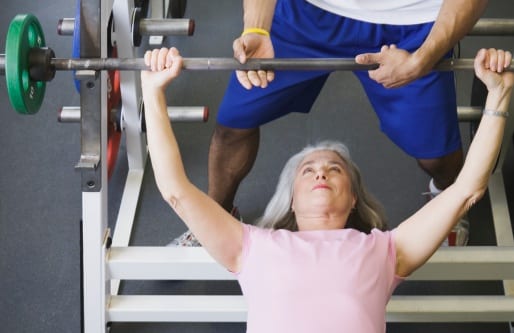Over a hundred women write, post, or call me daily with a question about postmenopausal weight gain and their questions are very similar:
“Why can’t I lose weight? I’ve been exercising and eating well and nothing has changed.”
In this post I’m going to tackle the exercise part of the equation. Know this, however – there is no one-size-fits-all eating plan. That has gone by the wayside and, particularly during a time of major hormone upheaval, you may need a radical change based on your individual needs. You must also reroute your nutrition to serve you right now. For an in-depth article on nutritional needs postmenopausal read Why Postmenopausal Women Can’t Lose Weight.
Yet, even with the best nutrition status, if you’re unintentionally wearing yourself out instead of building yourself up with your exercise, your body may get stuck. Any time your body feels threatened it’s going to tend to shut down instead of rev up.
The better exercise solution that will prevent postmenopausal weight gain or help you lose postmenopausal weight is not intuitive. You’re probably used to thinking the harder you work the more results you’re going to get. Prepare to be surprised.
Cut back.
You should exercise. You should exercise consistently. You should not simply exercise more in order to burn more calories. The how and why of your exercise to fight postmenopausal weight gain is anything but a textbook exercise prescription. It’s definitely not straight out of a boot camp code of operations. Boot camp formats, in fact, can be the exact opposite of what you need.
The goal of exercise is not to get better at exercise. It’s to get better at life. Exercise should be giving you more energy to be more active and more present in your life. Cutting back on exercise may actually make more sense. The idea is to get better – not just to get tired.
When traditional exercise isn’t working, or even seems to be backfiring by causing you more fatigue, less energy, and even more weight gain, it’s time to take a look at change. These three swaps could help you re-balance some hormones, and stop adding fuel to an already fired up system. These aren’t necessarily permanent changes, but temporarily backing off to reboot your metabolism can get you to your best energy again.
If you struggle to find an hour to exercise and potentially feel guilty about that, you’re off the hook. Limit your exercise to 20 or 30 minutes. More is not just more. It may push you over the edge and into adrenal fatigue. If you feel like you hit the wall when you attempt to go longer or you are exhausted during or after a workout, make this change and you may start to enjoy your workouts again.
Signs you need to shorten your workouts include feeling “flat” following a workout. Instead of feeling good you feel like you’ve pushed to do it and never really reached the “zone” where endorphins kick in.
2. Lower Intensity Cardio Workouts
Signs you need to reduce the volume of your intense workouts can include lower quality sleep, lack of interest in doing activities you’d normally do, and lack of results. At about 60% of your maximum effort you’re taming the hormone beast. That’s not breathing too hard. You should be able to carry on a conversation easily. One or two days a week you might throw in a hard interval every fifth minute, but otherwise you’re simply going to keep things easy and enjoyable. You should finish your session feeling good. If you’re used to punishing workouts you may feel you haven’t worked hard enough. That’s right where you want to be.
Heavy weights help you use cortisol correctly. If the stress hormone cortisol were a runner it would be a sprinter, not a marathoner. Too often we endure long-term stress. Then we repeat that mistake with our exercise. Keeping cortisol levels balanced will help prevent postmenopausal weight gain. You’ll also stimulate testosterone and growth hormone optimally with heavy weight training as compared to light weights. The heavier you go, the fewer repetitions you’ll be able to do, so you’ll naturally be abiding by suggestion number one above – shortening your workouts. Use a 10 or fewer repetition rule to define heavy lifting.
Though your intensity may feel higher compared to lifting lighter weights more times, it’s really a draw. Switching your focus to quality of repetitions rather than quantity is a smart plan for fighting postmenopausal weight gain.
These three small tweaks to your routine can be game-changers in re-balancing several key hormones that otherwise cause energy drain and increase your postmenopausal weight gain. The message you heard for too long was to burn more calories to lose more weight. It’s easy to see how quickly exercise can turn into a game of more: more minutes, more miles, more intensity. That’s where things go terribly wrong, causing the body to do the opposite of what you want.
When you reboot your exercise program, give it a few weeks. Small signs you’re doing the right thing will include less brain fog, better sleep, and a more stable mood. These will occur even before the scale changes.
You absolutely can prevent or reverse postmenopausal weight gain if you can lose the old thoughts about exercise.
The post Exercise Tips to Fight Postmenopausal Weight Gain appeared first on Prime Women | An Online Magazine.
from Prime Women | An Online Magazine https://ift.tt/323SJ9f


Comments
Post a Comment